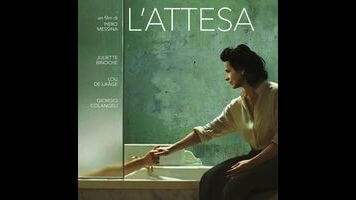L’Attesa makes absolutely no sense, but it looks good doing it

The trailer for L’Attesa, an Italian drama starring Juliette Binoche, constitutes a masterful exercise in obfuscation. Half the length of an average trailer (at just one minute and 15 seconds), it reveals almost nothing about the film’s narrative, merely showcasing random images set to a Widowspeak tune. Brief, subtitled dialogue reveals that a young woman (played by Breathe’s Lou De Laâge) is waiting for her boyfriend (the film’s title translates as The Wait), that she’s staying with her boyfriend’s mother (Binoche) while she waits, and that Mom is apparently lying to her, but that’s all we get. It’s a canny strategy—partly because most trailers give far too much away, but mostly because L’Attesa’s plot is too ridiculous to withstand even trailer-length scrutiny. The only way to enjoy this movie is to concentrate on its frequently stunning compositions and ignore the fact that none of it makes even a tiny lick of sense.
Set in a particularly gorgeous part of Sicily, L’Attesa opens with Anna, the divorced French expat played by Binoche, mourning somebody’s death. The deceased’s identity is never quite specified, but all evidence points to it being her adult son, Giuseppe. Certainly, other mourners look startled and concerned when Giuseppe’s girlfriend, Jeanne, shows up and asks where he is. But Anna, after ducking Jeanne for a while, eventually tells her that it’s Giuseppe’s uncle who’s died, and that Giuseppe will arrive on Easter, in a few days. So Jeanne sticks around, killing time by swimming in the ocean and lightly flirting with one of the local boys. In between, she leaves angry and/or pleading voicemail messages for Giuseppe… to which Anna listens, as she has possession of Giuseppe’s cell phone. (Hmm…) Finally, Anna sits Jeanne down and apologizes for having lied to her. Giuseppe isn’t coming. Why not? Because he’s dumped Jeanne. Sorry.
By not expressly showing the viewer who died, first-time director Piero Messina (who collaborated on the screenplay with three other writers) clearly intends to foster ambiguity. Everything has two plausible (though not equally plausible) interpretations. It’s all cleverly done, but there are just way too many blatantly nonsensical elements. Why does Jeanne accept Anna’s initial explanation of Giuseppe’s absence? Wouldn’t he be more likely to be there, not less, if his uncle just died? If he’s still alive, and just avoiding Jeanne, why does his mother have his phone? If he’s dead, and Anna wants Jeanne to let him go, wouldn’t telling Jeanne the truth serve that purpose much better than pretending that he no longer loves her? The one potentially compelling angle for this scenario would be if Anna were in such extreme denial about losing Giuseppe that she’s choosing to keep him alive via Jeanne’s ignorance, but Binoche’s performance never approaches that degree of sadistic pathology.
Messina previously worked as an assistant director on Paolo Sorrentino’s The Great Beauty, and he shares Sorrentino’s penchant for visual flamboyance, though not his caffeinated editing rhythm. L’Attesa frequently views its characters from a great distance, at the center of neatly symmetrical architectural spaces or as tiny pools of light engulfed in a vast darkness. Like a lot of first films, it’s often distractingly gorgeous—a boon, in this case, since distraction from various unanswered questions is precisely what’s needed. (There’s no overlooking the blunt symbolism of Giuseppe’s ostensible return on Easter Sunday, though.) Meanwhile, what should be the movie’s emotional core gets frittered away in mind games. Even the final scene, which pulls off a lovely moment of pure empathy, falls prey to involuntary speculation about which version of events it seems to confirm. Best to view the whole thing as an abstract, feature-length trailer. It plays better that way.